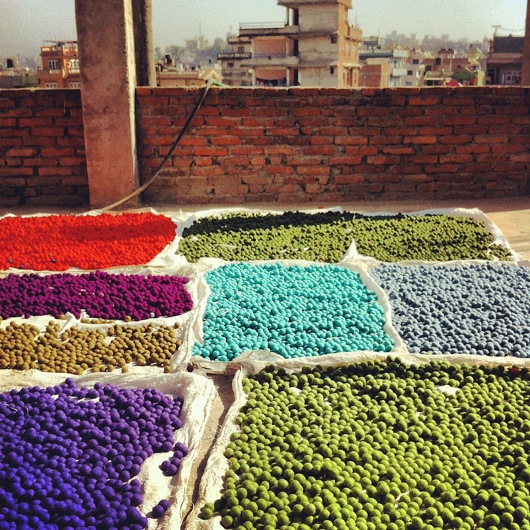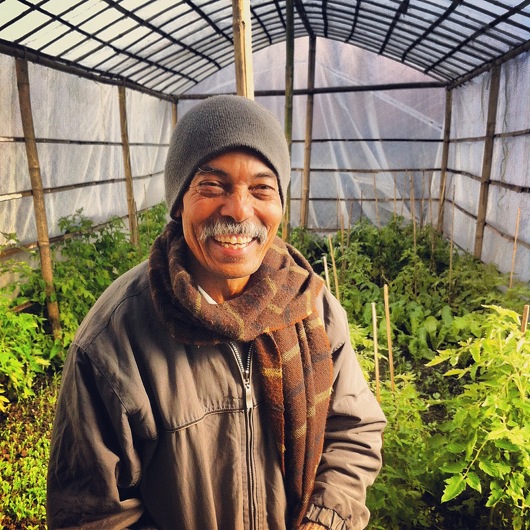Women in the World: A Follow Up with Lara Cameron
By Joanna Francis You'll remember that late last year, we caught up with Lara Cameron of Melbourne fabric design studio Ink & Spindle, before she took off on a study tour to Nepal. Lara was part of a tour organised by Steph Woollard, founder of Seven Women, a not-for-profit working with women with disabilities. Today, Lara is joining us again to share with us a little about her experiences in Nepal (illustrated with some of her photos!).
Lara, welcome home! Can you remind us of the purpose of your trip to Nepal, and tell us about where you visited and what you did?
Where do I start?! The whole trip felt like a lifetime worth of experiences jam packed into a mere 3 weeks! I guess generally the purpose of the trip was to learn about fair trade enterprises and production in Nepal. We visited a whole host of different fair trade businesses (felt workshops, silversmiths, craft producers, up-cyclers). We learnt about their processes, their challenges, who they employed and how they were making a difference in Nepalese society.
We also spent lots of time getting to know the Nepalese people, learning about their way of life, both in cities and rural areas. Nepalese people are renowned for being friendly and cheerful and that definitely seems to be true. They have an infectiously warm and positive nature. Their lives don't revolve around working, but instead they are centred around family and community. Although these people might be 'poor' by western standards they seem truly happier. This might sound flippant and naive but it really does seem that the simpler your life is the happier you can be. As humans (particularly Westerners) we find it so hard to be content, but having less opportunities, lofty ambitions or obsession with material goods can be somewhat liberating.
Can you tell us a little about meeting the women involved and seeing how Seven Women is supporting disadvantaged women?
Seven Women is basically set up to empower women who are disadvantaged or living with a disability. Steph is passionate about establishing business models that promote self reliance, rather than long term dependence on external aid. Her original centre EPSA used to make a lot of felt craft goods that Steph would wholesale here in Australia. Now they wholesale goods to the local market and are functioning independently, which is great.
Steph has just recently established a new Seven Women centre which is where we spent a lot of time during our trip. The new centre can house up to 10 women and also has a workspace for even more women and a shop front (plus a rooftop terrace and a veggie patch!). We had the great privilege of being able to assist in fitting out the new house and also meeting a lot of the women who live and work there. They are absolutely gorgeous, warm hearted people and a joy to work with.
Is there someone that you met that particularly inspired you, or shared their story with you of how their life had been changed by their involvement?
Well Steph is definitely an inspiring individual, but I have to say I was also very inspired by a social entrepreneur we were introduced to named Sanu Kaji. Sanu established the Foundation for Sustainable Technologies and is possibly the most endearing, enthusiastic and inspirational person we met over there! Sanu has dedicated the latter part of his career designing sustainable fuel alternatives for the Nepalese people, in particular his unique "Briquettes" which are made from a compressed combination of waste paper and biomass (sawdust, grass, leaves or rice husks etc). 1.5kg of his briquettes is the equivalent to 5-8kg of timber in terms of cooking capacity, and he is training people to make their own.
What were some of the obvious challenges in working in an international context like this?
Gosh, where do I start? Communication is an obvious one. There are very few people in Nepal who have fluent English skills, so explaining the finer details of things is definitely a challenge. The Nepalese people also have that tendency to never say no. Very frustrating when you're trying to figure out if or when something can be done! Culturally there are challenges too - they can have a different perspective on what constitutes "good quality"; Steph has worked very closely with her team to make sure they're producing what a Western market would find acceptable. The other massive challenge is rolling blackouts! Most places in Kathmandu only have power about half of the day, and sometimes that allocation is largely at night time! This definitely affects productivity and turn around times - no wonder Western customers get flabbergasted when something takes 3 months longer to produce than they expected!
Did you have the opportunity to share some of what you've learnt through developing your own creative business here in Melbourne?
I did! I think that was my favourite part actually - getting to work alongside the women and teach them things! I went over there with a prototype for a new product - laptop sleeves made from handmade Nepalese felt. The felt they work with is just so lovely and textured and beautiful in its own right, so I thought that we should develop a product that really showcased this. I found myself sitting on the floor of the new Seven Women centre, surrounded by these cheerful and cheeky women and bits of felt and scissors and chalk and patterns, laughing at my poor Nepalese skills and our haphazard communication, generally having a ball. That was great.
Did that experience change or have any impact on the way you view your business practices here?
It did make me appreciate what we have here and how much easier it can be to produce something locally. After seeing first hand how difficult it can be to source the right things and communicate effectively to have a quality product made in a country where "quality" has a different meaning... I feel very lucky that we have the ability to produce in-house and don't have to rely on overseas labour to do what we do.
From an emotional/personal perspective I'd like to think that witnessing the Nepalese way of life changed my perspective on life here a bit. I'd like to have a bit more relaxed pace of life, feel less like I need to constantly be keeping up with trends and what everyone else is doing, and focus more on home and family and friendships to give life meaning.
Will you have any continuing involvement with Seven Women?
I definitely plan to. I still need to ensure the new product line gets produced properly, and I'd definitely like to keep working with Steph on her product range - either hands on or just providing feedback and advice from time to time.
---
If you'd like more information about the work of Seven Women or their study tours to Nepal, please go to their website to find out more. And thanks Lara for sharing your experiences with us.
Joanna Francis spends most of her time hanging out with her two year old son. But she also works for a children’s foundation and has recently started her own little business making baby quilts. In the past, Joanna has worked as an aid worker in several developing countries, and is passionate about the rights of women and children. You can visit her and her blog at www.miettehandmade.com







